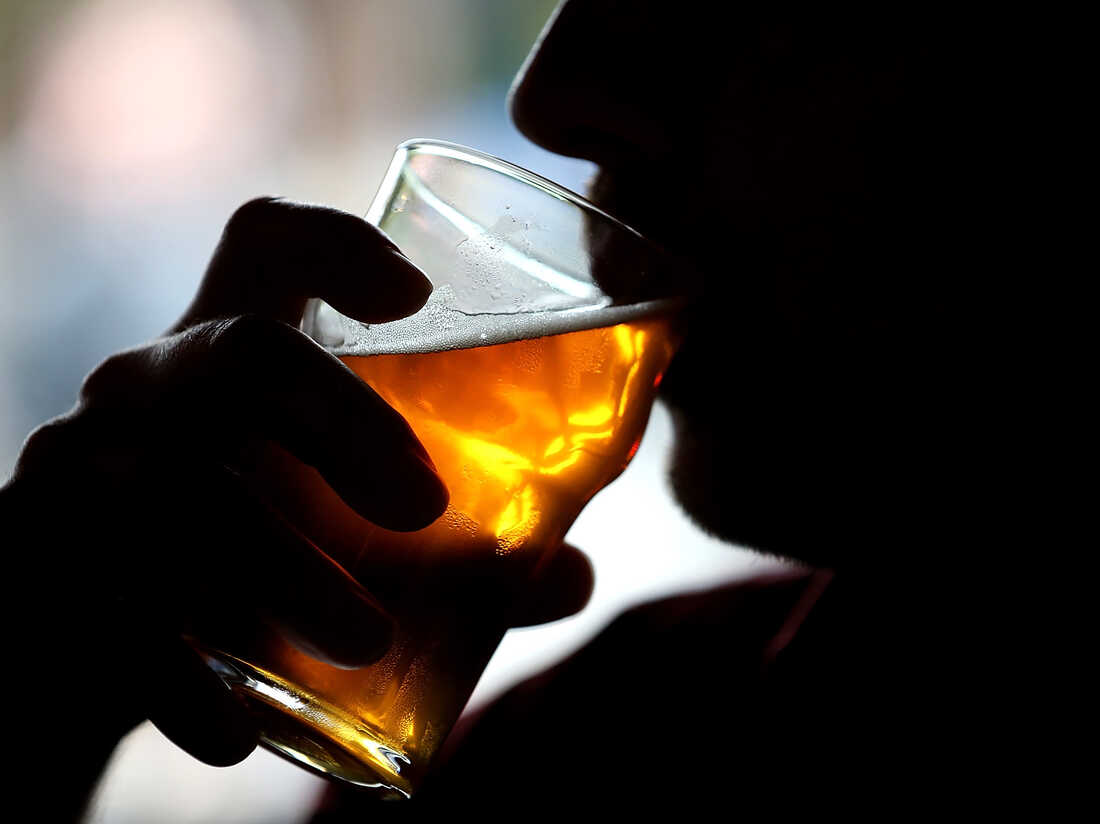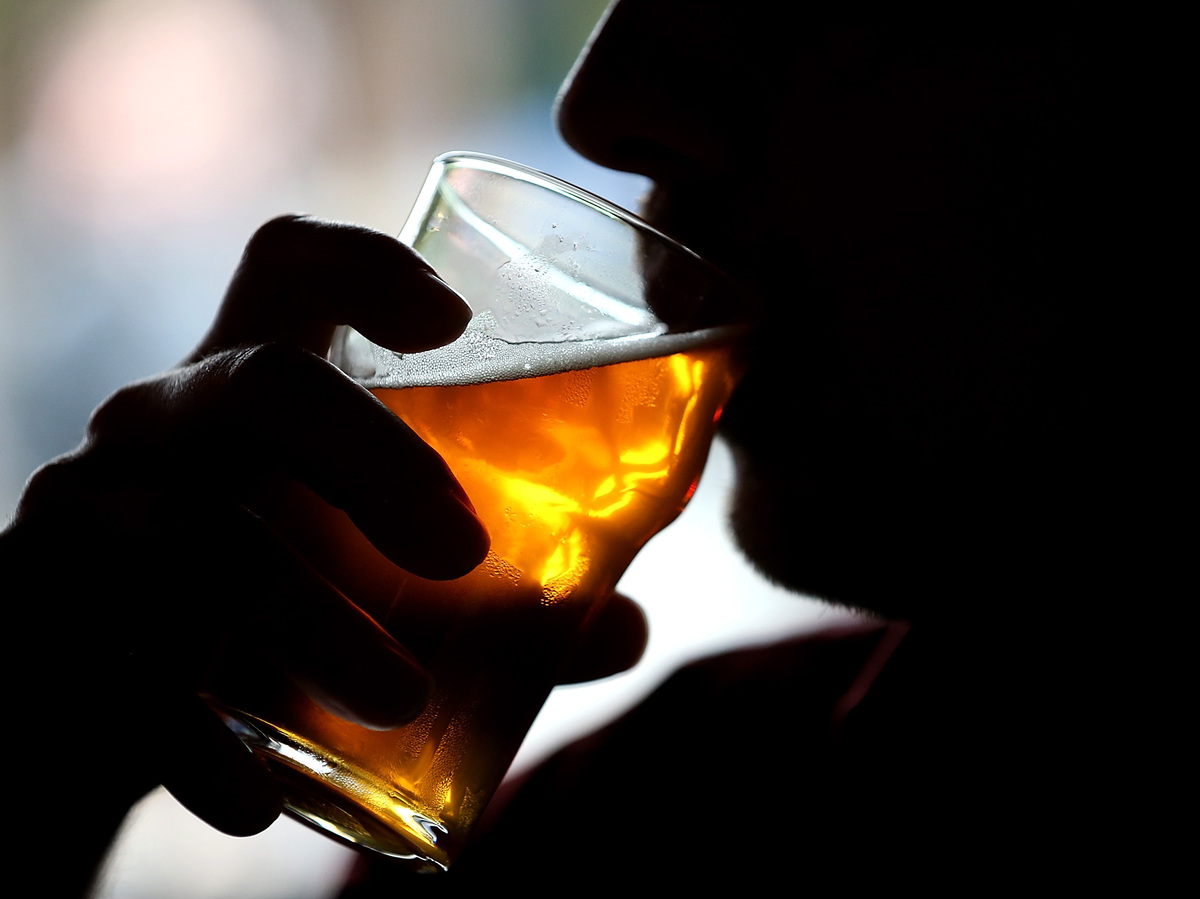New South Korea research finds lowering consuming lowers danger : NPR
[ad_1]

A brand new research seems for associations between modifications in alcohol consumption and the danger of dementia, in analysis that’s primarily based on almost 4 million individuals in South Korea.
Justin Sullivan/Getty Pictures
disguise caption
toggle caption
Justin Sullivan/Getty Pictures

A brand new research seems for associations between modifications in alcohol consumption and the danger of dementia, in analysis that’s primarily based on almost 4 million individuals in South Korea.
Justin Sullivan/Getty Pictures
When you’re fearful that consuming alcohol may elevate the danger of dementia as you grow old, a big new research from South Korea can present some insights. That begins with the concept that on the whole, slicing down on alcohol is a good suggestion.
“Sustaining gentle to average alcohol consumption is related to a decreased danger of dementia, whereas heavier consuming will increase the danger of dementia,” the research’s first creator, Dr. Keun Hye Jeon, instructed NPR.
One a part of the research’s conclusions appears to have stunned many individuals: It discovered that whereas dropping from heavy to average alcohol consumption lowered the danger of dementia, so did the “initiation of gentle consuming.”
Examine sees a fancy interplay of alcohol and well being
“Those that drink alcohol throughout the really useful pointers are usually not suggested to cease on the grounds of lowering the danger of dementia,” Jeon mentioned, “though slicing again on alcohol consumption could carry different well being advantages.”
In comparison with individuals who did not change their alcohol habits, Jeon and her colleagues discovered that two teams confirmed a heightened danger of dementia: drinkers who elevated their consumption, and individuals who give up altogether.
“Quitters from any degree of alcohol consumption confirmed increased danger of all-cause dementia in contrast with those that sustained the identical degree of consuming,” in response to the analysis paper.
A lot has been manufactured from that facet of the findings, as individuals attempt to parse whether or not it’d symbolize a real trigger and impact — and a doable new knowledge level in their very own choices about consuming. However the researchers warn that the upper dementia dangers of people that give up consuming of their research “are suspected to be primarily attributed to the sick quitter impact, which is outlined as an individual quitting (or lowering) a sure hazardous exercise due to well being points.”
In different phrases, they might have give up consuming as a result of their well being worsened, relatively than their well being worsening as a result of they give up consuming.
So, what can drinkers do to restrict their danger of dementia?
When requested what stunned researchers essentially the most within the outcomes, Jeon says it is the steep drop in danger when individuals reduce on alcohol, noting that heavy drinkers who moderated their consumption have been related to an 8% lower in danger for dementia from all causes, and a 12% decreased danger of Alzheimer’s illness.
“For the prevention of dementia, mild-to-moderate drinkers must curb the rise of their alcohol consumption, whereas heavy drinkers ought to scale back it,” mentioned Jeon, an assistant professor of household medication at CHA College in Gumi.
“Individuals who don’t presently drink alcohol shouldn’t be inspired to start out as a approach to scale back dementia danger,” she added.
Alcohol is thought to harm mind cells and impair reminiscence and different capabilities. Present U.S. dietary pointers urge adults to “drink sparsely by limiting consumption to 2 drinks or much less in a day for males and 1 drink or much less in a day for ladies.”
A key takeaway from the research, the researchers say, is that it means that even small reductions in alcohol consumption can assist scale back dementia danger.
The research included tens of millions of adults
To search for potential associations between alcohol use and dementia outcomes, the researchers drew on knowledge from the Korean Nationwide Well being Insurance coverage Service. The federal government-administered insurer affords free biennial well being exams to each insured individual age 40 and over.
The research included almost 4 million South Koreans — a particular cohort of adults who had consecutive NHIS well being exams in 2009 and 2011. The exams embody a questionnaire on medical historical past and private habits, together with consuming, smoking and train, together with lab assessments and demographic knowledge.
The analysis crew categorized individuals into 4 consuming classes: none; gentle (much less one drink per day); average (one to 2 drinks per day) and heavy (greater than two drinks per day).
Within the U.S., a typical drink is taken into account to include 14 grams (0.6 ounces) of pure alcohol, barely lower than the 15 grams used within the research. That equals a 12-ounce beer at 5% alcohol, a 5-ounce glass of wine with 12% alcohol, or 1.5 ounces of an 80-proof spirit.
The researchers additionally sorted individuals in response to whether or not they give up, decreased, sustained or elevated their alcohol consumption. Then, ranging from one yr after the second well being examination, researchers tallied which members of the cohort had been recognized with dementia via the tip of 2018.
The ‘sick quitter’ impact
“The sick quitter impact is predicated on the belief that illness onset and modifications in well being situation result in cessation of alcohol consumption,” Jeon mentioned, “so the danger for former drinkers is increased than that for abstainers.”
Within the research, former drinkers have been principally included within the nondrinker management group. However, she added, “The poor total well being of former drinkers could end in overestimation of the protecting impact of alcohol consumption.”
The research’s authors tried to compensate for that dynamic in plenty of methods, however “the sick quitter impact stays a supply of potential bias,” they wrote.
One other complicating issue is socioeconomic standing. The research discovered that individuals who give up consuming tended to be older and and have decrease incomes than individuals who maintained the identical alcohol habits. On the plus facet, the quitters did are usually nonsmokers and have been extra prone to get common train.
The Korean research additionally relied on individuals to report their very own well being habits, which researchers acknowledge as a limitation.
What does science say about alcohol consumption?
Heavy consuming and binge consuming are linked to continual liver illness, hypertension, a number of kinds of most cancers, and a raft of different well being issues, the CDC says. Extreme alcohol consumption is also related to violence, unintended deaths and accidents, and hurt to a creating fetus.
Exterior of the U.S., some latest advisories are extra stringent. A large worldwide research in The Lancet concluded in 2018 that “the most secure degree of consuming is none.” And final month, Canada’s newly up to date pointers prompted a stir when it concluded that any degree of alcohol consumption brings a danger, and that folks ought to limit themselves to 2 commonplace drinks or much less every week.
[ad_2]

No Comment! Be the first one.